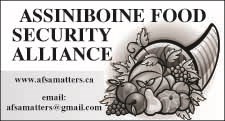Yorkton and area is blessed with an abundance of natural beauty and good quality land for producing food for humans and livestock. At this time of year field crops are ripening. Most of these crops are grains and oilseeds some of which are processed locally, but almost all ends up being exported from east-central Saskatchewan in one form or another. Farm generated production and export of these crops is not to be underestimated. Revenue flows back to support our local farmers, businesses and other services we rely on. The accrued benefits are enormous.
Vegetables, by comparison, are not nearly as significant in terms of tonnage and revenue generation. However, vegetables and fruits are no less significant when it comes to feeding ourselves and our communities. Vegetables are not grown in significant tonnages for export. That means we consume most of what we grow. Food security initiatives are important too as not all people participate equitably in the consumption of all the good healthy vegetables and fruits we are able to grow in the Yorkton area.
But fruits and vegetables are significant when it means feeding ourselves with fresh, wholesome food. It matters not whether they are produced in rural or urban areas because all taste delicious and all are full of nutrition. Quite simply, fruits and vegetables are good for us.
In Yorkton, urban vegetable production comes from a variety of sources including community gardens, school yard gardens, back yard gardens and to a lesser extent greenhouses. There is the potential to grow much more vegetables than what we currently produce.
In a simpler time terms like "eating local" or "100 mile diet" did not exist. After World War II, food shortages and rationing gave way to getting fruits like oranges, bananas and pineapples from distant lands that expanded our insatiable desire for new tasting, highly desirable foods. This trend continues today with an ever expanding list of what we want to purchase. At the same time, highly processed foods came from somewhere else too and small grocery stores gave way to large supermarkets.
In recent years there has been considerable discussion particularly among regulators, producers and marketers anxious to have some clarity about what growing food locally really means. For some, growing food locally could be up to or within 100 miles, for others it is provincial boundaries and even larger geographic boundaries or other considerations favoured by others. Their motives may be quite different because of the business interests that are at stake.
Could it be that growing locally means growing food within an area where rural and urban residents would normally conduct most of their business. In east-central Saskatchewan that would be Yorkton or possibly an area roughly the size of Sunrise Health Region.
There is also a debate between those who advocate for more locally grown fruits and vegetables and proponents who suggest fresh produce continue to be brought to supermarkets from any location in the world that is cost-effective. In reality, both sides in the debate make good arguments when it comes to food security.
However, it would seem to make sense that if we can produce fruits and vegetables in Saskatchewan without having to import them from other countries, then we should do so.
Some of the most flavourful sources of local fruits and vegetables include: growing and preserving your own; trusted sources such as friends, neighbours and relatives; community gardens; gardeners' markets; urban and rural food producers; and farmers' markets.
One of the most significant benefits of growing your own food comes from knowing what you can accomplish, direct from your garden. And the physical activity burns calories and is a creative experience. Harvesting and preparing locally grown food means a diet rich in fruit and vegetables.
Why should people produce and consume locally grown fruits and vegetables? Buying locally grown produce supports the local economy. Buying locally decreases the distance food is transported so that it can be harvested closest to its highest quality, highest nutritional level and peak taste. Buying locally builds understanding between rural and urban people, particularly when we come to further understand about who produces our food and how it is produced. These reasons and many others all enhance the overall food experience.
If you can't grow your own food, securing locally grown fruits and vegetables is the next best choice. Preserving your own food offers even more benefits.
Contributing to food security is getting to know a farmer or gardener - always a great idea.




